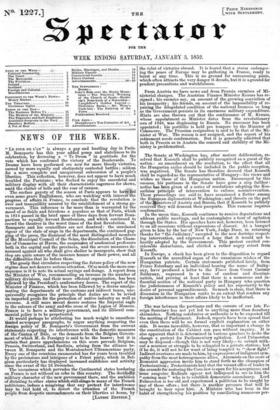The Senate at Washington has, after mature deliberation, re- solved
that Kossuth shall be publicly recognized as a guest of the nation : an amendment on the resolution, to the effect that all the Hungarian exiles should be included in the public reception, was negatived. The Senate has therefore decreed that Kossuth shall be regarded as the representative of Hungary—his views and wishes as those of the Hungarian nation. Encouraged by this -success, his partisans in the Senate have gone a step further : notice has been given of a series of resolutions adopting the Kos- suthian principle of intervention to enforce nonintervention. These proceedings are said to have occasioned a flutter among the E pean diplomatists at Washington; and threats on the part
of the inters of Austria and Russia, that if Kossuth be publicly receiv they will demand their passports. This rumour requires confirmation;
In the anean time, Kossuth continues to receive deputations and address public meetings, and he contemplates a tour of agitation through the States. His speeches have not, however, been listened to on all occasions without expressions of dissent. At a banquet given to him by the bar" of New York, Judge Duer, in returning thanks for "the Judiciary," excepted to the new doctrine respect- ing intervention, and expressed a hope that it would not be hastily adopted by the Government. This protest excited con- siderable disturbance, and elicited a rather angry retort frdm Kossuth. - In Europe, a check has been given to the disposition to regard Kossuth as the accredited organ of the unanimous wishes of the Hungarian patriots. Certain statements published lately, from Prince Esterhazy and an individual bearing the name of Bathy- any, have produced a letter to the Times from Count Casimir Bathyany, expressed in a tone of candour and discrimi- nation and proving at least that there is a numerous and in- fluential section of the national party in Hungary who question the judiciousness of Kossuth's policy and his superiority to the desire of personal aggrandizement. So much is clear, that there is dissension in the Hungarian ranks to an extent that renders any foreign interference in their affairs likely to be ineffectual.


































 Previous page
Previous page